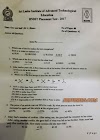Click on the tabs to see the Detailed Syllabus:
Module Details
| Module Code | HNDIT 1107 |
|---|---|
| Module Title | Mathematics for IT |
| Credits | 2 |
| Hours /Week |
Lectures - 15 Lab/Tutorial - 30 |
| Semester | 1 |
| GPA/NGPA | GPA |
| Module Type | Core Compulsory |
Module Aims & Objectives
▪To introduce set theory and their algebraic relationships
▪ To introduce matrices and algebraic relationships and to enable the students to understand multi-dimensional representation of data and information
▪ To provide core knowledge of Mathematics as a background in an advanced topics such as Graphics & Multimedia, Probability & Statistics
▪To guide students to apply appropriate mathematical knowledge and skills towards solving problems that are beyond ordinary coursework
▪ To introduce matrices and algebraic relationships and to enable the students to understand multi-dimensional representation of data and information
▪ To provide core knowledge of Mathematics as a background in an advanced topics such as Graphics & Multimedia, Probability & Statistics
▪To guide students to apply appropriate mathematical knowledge and skills towards solving problems that are beyond ordinary coursework
Learning Outcomes
At the end of the module the student will be able to:
▪ Construct Sets and describe basic set operations
▪ Describe and use algebraic operations in Sets
▪ Identify relations and functions
▪ Examine the characteristics of relations and functions
▪ Describe the matrices and apply basic algebraic operations on matrices
▪ Solve systems of linear equations using matrices
▪ Construct Sets and describe basic set operations
▪ Describe and use algebraic operations in Sets
▪ Identify relations and functions
▪ Examine the characteristics of relations and functions
▪ Describe the matrices and apply basic algebraic operations on matrices
▪ Solve systems of linear equations using matrices
Outline Syllabus
1. Sets and basic Set operations
2. Construction of Sets
3. Algebra of relations
4. Introduction to Functions
5. Types of Functions
6. Matrices and basic matrix operations
7. Singularity and Determinants
8. Systems of linear equations
2. Construction of Sets
3. Algebra of relations
4. Introduction to Functions
5. Types of Functions
6. Matrices and basic matrix operations
7. Singularity and Determinants
8. Systems of linear equations
Assessments
| Type | Activity | Weighting |
|---|---|---|
| Continuous Assessment | In class assignments and quizzes | 50% |
| Take home assignments and tutorials | ||
| Semester Examination | Final Structured Paper | 50% |
Recommended Learning Activities
Classroom based teaching and learning supported by group discussions, tutorials and
assignments.
Resources: Equipment, Tools and Materials
Internet resources and Mat lab version 7 will be helpful.
Prescribed Books
[2]. Richard Johnsonbaugh, Discrete Mathematics 6th ed. Macmillan. ISBN 0-13-045803-1
[3]. Keith Devlin, (2nd ed.) 1993. The Joy of Sets. Springer Verlag, ISBN 0-387-94094





0 Comments